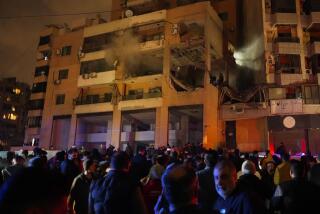The news from Iraq
- Share via
THE KILLING OF ABU MUSAB ZARQAWI may not have been the most important news from Iraq on Thursday. That designation may fall to the appointment of three new security ministers, giving Iraq a complete government for the first time since elections last December. Without Zarqawi, as even President Bush noted in the Rose Garden, the insurgency and attacks in Iraq will continue. Without a competent government, however, there is no hope for an end to the violence.
That said, there can be little argument that the death of Zarqawi, who was killed when an Air Force jet dropped two bombs on his house about 30 miles north of Baghdad, is the best military news from Iraq since the capture of Saddam Hussein 2 1/2 years ago. And Iraq’s leaders are now in a better position to capitalize on the development than they were in December 2003.
From a practical standpoint, Zarqawi’s killing removes the insurgency’s most renowned leader. By all accounts, the head of Al Qaeda in Iraq was an effective terrorist, having masterminded the bombing of the U.N. headquarters in Baghdad and hotels in his native Jordan. He also is said to have personally beheaded some prisoners, including an American engineer, Nicholas Berg.
Because Zarqawi was a foreign interloper, his passing will hardly be mourned by ordinary Iraqis -- quite the contrary. By the same token, however, his removal doesn’t materially alter tensions between native Sunni and Shiite factions.
Symbolically, his death may be more significant. As Bush said: “The ideology of terror has lost one of its most visible and aggressive leaders.” The question is not whether there will be others to replace him; there will be. Nor is it whether the violence will pause; it won’t. But the attack should give an important psychological boost to U.S. troops in Iraq. Zarqawi had been taunting Americans at every turn, leaving some Iraqis to wonder about the efficacy of U.S. military might. His death will serve as a reminder to foreign terrorists and Iraqi insurgents that they can be extinguished at any moment.
Still, it is the cabinet appointments that are likely to have a more lasting political effect. Just a few minutes after his joint news conference with U.S. leaders announcing Zarqawi’s death, Iraqi Prime Minister Nouri Maliki presented to parliament his choices for interior minister, defense minister and national security advisor -- a Shiite, a Sunni and an ethnic Kurd, respectively. He thus broke a logjam that had lasted almost three weeks and threatened to render his government impotent.
Almost 1,400 bodies arrived at Baghdad’s morgue last month, and on Thursday several bombs killed dozens of people and wounded scores more in Baghdad. In response to Zarqawi’s death, Al Qaeda in Iraq issued a statement saying it “only makes us more determined to continue the jihad.”
So Iraq’s civil war appears no closer to an end because of Zarqawi’s death. But Iraq is closer to a viable government because of Maliki’s appointments. And its only hope for peace is for that government to be effective and accepted as representative of all of Iraq.
More to Read
Sign up for Essential California
The most important California stories and recommendations in your inbox every morning.
You may occasionally receive promotional content from the Los Angeles Times.












